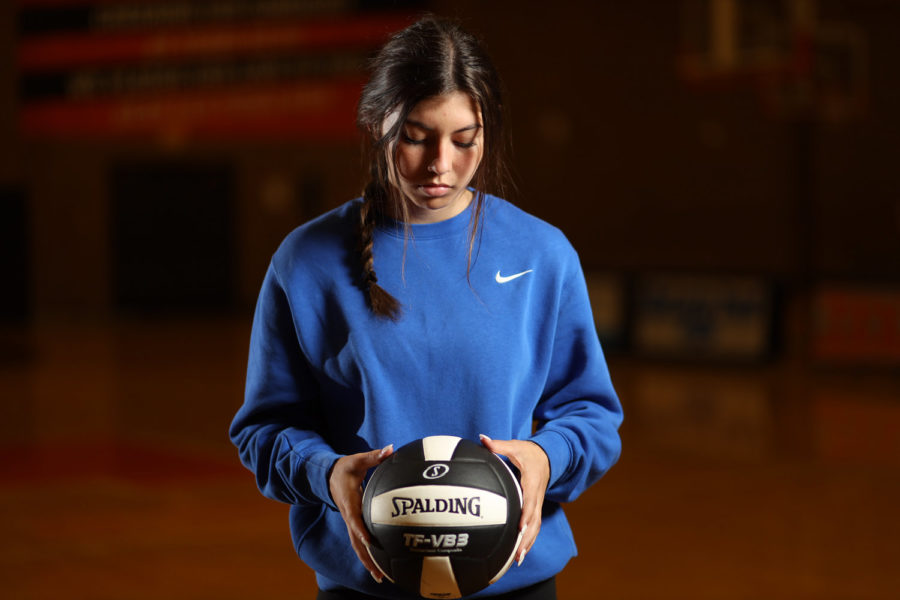Matter over mind
Student athletes across the nation are being overcome with stress and anxiety
Photo by Teara Duke
Photo illustration: Athletes face multiple stressors, triggering anxiety and depression.
May 13, 2022
Katie Meyers, University of Stanford, goalie and team captain.
Sarah Shulze, University of Wisconsin, elite track and cross country star.
Lauren Bernett, James Madison University, CAA Player of the week…announced the day before her death.
All three of these athletes have two things in common: Division 1 athletics and suicide.
In the last month, the nation has lost three lives – all by suicide. Three lives overcome with stress and anxiety. Three lives that didn’t have to be taken. Three lives gone too soon.
The spike in suicide in relation to athletic programs has allowed a certain question to rise nationwide: how much is too much? Are coaches hyper focused on the athletic standpoints in programs as opposed to the mental health of their athletes? Or is the stress from missing assignments too much? What is pushing these athletes too far?
The Oklahoma Sooners released a video of their Head Softball Coach Patty Gasso giving a spiel about her opinion on mental health to their Instagram page on April 26, with a caption reading: “Mental health matters. Today and everyday.”
In the statement released by the OU softball Instagram page, Gasso stated how some of the aspects of being a student athlete could contribute to the heavy stress and overwhelming mental health issues that athletes sometimes seem to be drowning in.
“They have a lot of plates that are spinning and they’re trying to balance everything,” Gasso said. “It can be absolutely overwhelming.”
Gasso also brought up the stigma around elite athletics, and how it’s so loudly vocalized that athletes need to be strong and always push through their hardships.
“It’s funny because athletics has always been like ‘be tough’ and ‘don’t be a wussy’, and all of that,” Gasso said. “But I must, 100%, must have a safe, open space for athletes to speak and be truthful. The problems are when they’re hiding.”
By opening up her athletes to a strong set of psychological resources, Psychological Resources for OU Student-athletes, (PROS), Gasso is protecting her athletes from debilitating mental health issues before they become too much to bear.
“I asked our PROS office to come in and lead us through conversations and allow our players to talk and give them a safe space to express themselves,” Gasso said. “It’s not about success, I just want to make sure that our team feels the freedom to express themselves and that we have someone there listening at all times.”
The American College of Sports Medicine made a statement on the increase in mental health issues across elite, as well as professional, athletes. The ACSM listed factors that may act as stressors for student-athletes, leading to an increase in stress and anxiety.
Factors listed included: “missed classes due to off-campus sports competitions, being away from home for the first time, social isolation from students other than their teammates and adapting to constant visibility within their campus and communities.”
The amount of games played by the athletes in collegiate sports is significantly larger than that of a high school student.
The difference between games played is drastic in almost all sports, not including football, who play around the same amount of conference and non conference games.
However, collegiate softball and baseball teams play around 60 (averaging 37 away) games per season depending on how far they go into post-season play, whereas high school softball/baseball players only compete in around 35 games, only about 16 of them being away.
Despite playing a lot less games than a collegiate athlete, missing class can increase stress in high school athletes as well.
With that being said, missing the academic portion of school multiple times leads to an increase in anxiety and a decline in mental health, which was the main stressor stated by student-athletes here at Texas High.
On the bright side, some student athletes are placed with teachers who will take the time out of their long school days to give student-athletes the extra help they may be seeing, however, some athletes don’t get that lucky.
Sophomore dual-sport athlete Anna Lee vouched for this statement.
“Academics can add up very quickly when you’re missing so much school for sports,” Lee said. “This stress is often discouraging in sports and I tend to try my best, but sometimes it’s overwhelming and I want to quit more than I want to play.”
On top of the endless mounds of work piling up on an athlete after missing class, the expectations athletes have to meet in order to retain eligibility can also add on to the stress a student has to endure.
“Academics as a whole is just a bunch of expectations that athletes have to meet,” junior soccer player Jackson Haltom said. “That puts a lot of stress on some kids that, you know, can’t meet those expectations all the time.”
This was the case for Wisconsin track star, Sarah Shulze, who committed suicide on April 13.
A statement was released by Sarah’s family to CBS News regarding pressures that Sarah was fighting in her final months on earth.
“Sarah took her own life,” the family said. “Balancing athletics, academics and the demands of everyday life overwhelmed her in a single, desperate moment.”
Academics on top of athletics can increase anxiety and stress all at the same time, and in a hopeless, distressed instant, a life can be gone, just like Sarah’s.
However, leaders working nearby student-athletes can help prevent anything like what happened to Sarah from happening ever again.
So yes, the academic aspect of things can become overwhelming, but there are ways that the adults in a student-athlete’s life can help ease some of the pressure.
Carrie Rayburn, English teacher, touched on the few ways she tries to help take that extra stress off the shoulders of her student-athletes.
“Generally I will try to work with the student-athletes,” Rayburn said. “I’ll take a few minutes, you know, either before or after class and explain what [they] don’t understand. I upload their work to Google Classroom, and if they want hard copies, they can swing by and get them.”
One teacher, however, isn’t enough to help the 8 million athletes competing in high school sports across the nation.
One teacher isn’t enough to help the 500,000 NCAA athletes struggling with school, struggling with mental health.
One teacher isn’t enough.
Not all stress stems from academics. The performance aspect on court can have just as much impact on an athlete’s mental health, no matter how “fun” sports are supposed to be.
“There are many stressors that can impact an athlete’s mental health,” Assistant Volleyball Coach Robin Holland said. “[I think] the stress of not making mistakes and the [toll] practice takes on their bodies [are factors].”
Student-athletes also need support from their coaches, just as much as they would from a teacher or a parent.
For the most part, the athletes of Texas High feel as though they have a voice, and that they have people to talk to. Most of the athletes have coaches who have deep bonds with their athletes, and genuinely care for their wellbeing.
“I think relating to the athlete is important,” Holland said. “I would hope my athletes love who they are as people and not define their identity as how hard they can hit a ball.”
















